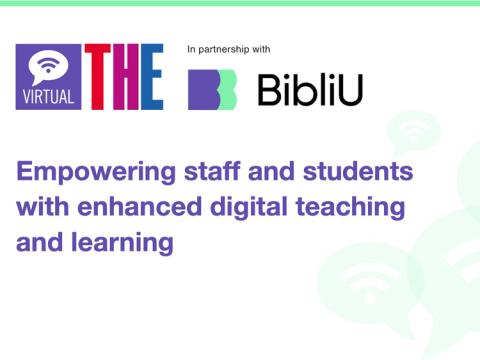At a Times Higher Education round table hosted in partnership with learning enablement platform BibliU, panellists discussed how to empower staff and students with enhanced digital teaching and learning.
John Holdcroft, associate vice-president at BibliU, explained the company’s universal learning solution. “Our main goal around this is getting all students [access to course] content on day one, not just students that are wealthy, organised, prepared or focused,” he said. The course content is chosen with the partner institution’s faculty, drawn from both major and small publishers and can incorporate free open educational resources.
The panel agreed that material must be accessible and relevant, noting the creative ways that students have found to acquire materials, including sharing links to alternative, sometimes free, sources. Holdcroft said the cost of books “is just too high”.
Susan Hrach, Fulbright Canada distinguished research chair in the scholarship of teaching and learning at Carleton University, said she’s seen students get around costs by accessing a free online version of an out-of-date textbook and comparing it with a single, shared current edition.
The decision to purchase textbooks at all is now carefully considered, explained Anna Porcaro, executive director of online and adult learning at Wichita State University. Porcaro said that adult learners in particular are focused on balancing their education goal with their lives outside academia.
“They’re not going to buy a textbook unless they know that it’s useful,” Porcaro said, explaining that if students hear that a textbook isn’t referred to much and the exams are passable with just the lecture information, they’ll bypass the literature. “If it’s a textbook that’s $250 versus filling up a tank of gas, they’re going to go for the tank of gas.” Porcaro suggested that providing no-cost or low-cost materials avoids these decisions having to be made.
The digital experience must match expectations, meet learner goals and be monitored to make sure it remains effective, the panel agreed. Mary Ellen Wiltrout, director of online and blended learning initiatives at Massachusetts Institute of Technology, said that pre-pandemic, students were typically supplied with disparate resources, but MIT’s incorporation of a learning management system has improved this.
“The process and experience has to be more streamlined for students so that when they’re logging on they see everything in one place,” Wiltrout said. “That’s been a really successful strategy in having disciplined experts that also know the technology side and can help with the pedagogy to implement these changes in courses. And it’s definitely not a one-time, change the entire course kind of thing. It’s building over years.”
A streamlined system, coupled with a smart, reactive analysis of its usage data will help provide a fit-for-purpose set of resources, the panel agreed. But Douglas Harrison, vice-president and dean of the School of Cybersecurity and Information Technology at University of Maryland Global Campus, insisted that data must be used to improve the overall student experience. “Our job is not just about curriculum design and delivery,” Harrison said. “It needs some very intentional expertise to help advocate for cultural change.”
The panel:
- M’hammed Abdous, assistant vice-president for teaching and learning with technology, Old Dominion University
- Douglas Harrison, vice-president and dean, School of Cybersecurity and Information Technology, University of Maryland Global Campus
- John Holdcroft, associate vice-president, BibliU
- Susan Hrach, Fulbright Canada distinguished research chair in the scholarship of teaching and learning, Carleton University
- Jeff King, executive director, Centre for Excellence in Transformative Teaching and Learning, University of Central Oklahoma
- Alistair Lawrence, head of branded content, Times Higher Education (chair)
- Julia McKee, marketing specialist, BibliU
- Anna Porcaro, executive director of online and adult learning, Wichita State University
- Marcela Ramirez, associate vice-provost for teaching, learning and digital transformation, University of Texas at San Antonio
- Catherine Schenker, assistant dean for online learning, American University Washington College of Law
- Deanna Schultz, associate dean, School of Education, University of Wisconsin-Stout
- Rebecca Stein, professor of cultural anthropology, Duke University
- Mary Ellen Wiltrout, director of online and blended learning initiatives, Massachusetts Institute of Technology
Find out more about BibliU.


comment